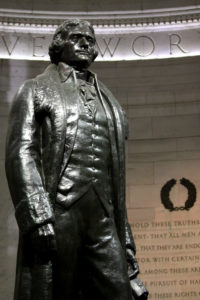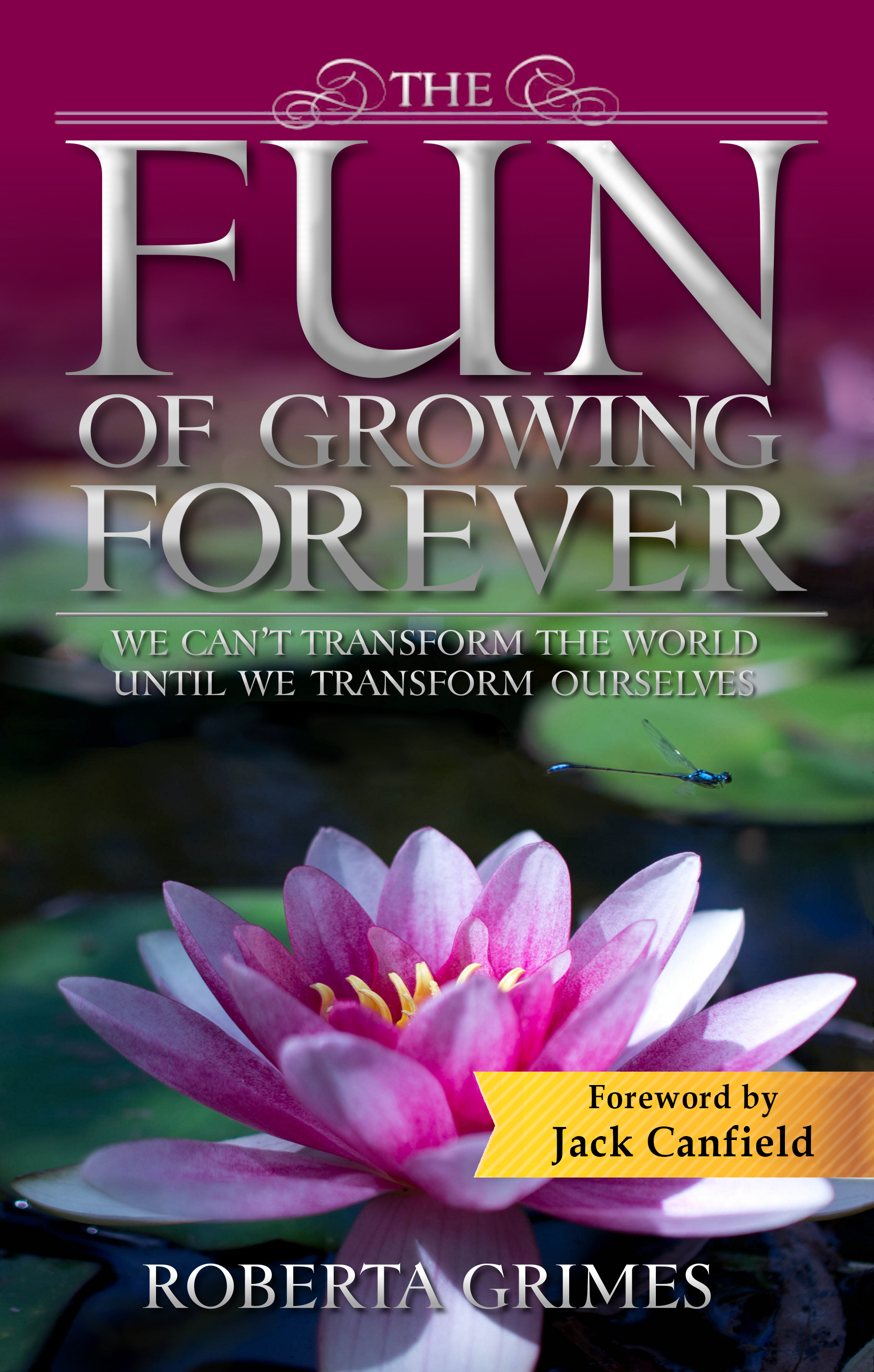“Millions of innocent men, women, and children,
since the introduction of Christianity,
have been burnt, tortured, fined, imprisoned;
yet we have not advanced one inch toward uniformity.
What has been the effect of coercion?
To make one half of the world fools and the other half hypocrites.”
– Thomas Jefferson (1743-1826), from Notes on the State of Virginia (1787)
 Thomas Jefferson was the first Secretary of State, the second Vice President, and the third President of the United States. He was the primary author of the Declaration of Independence, and he made it a document of such emotional power and intellectual weight that it has become the moral conscience of the most powerful nation on earth. You or I would be proud to have lived such a life! But the being who was Thomas Jefferson was instead deeply disappointed by it. When he spoke through Leslie Flint in 1960, he refused to talk about that lifetime. When he spoke to me through a medium in 2015, he said, “I had too much power and I didn’t always use it well.” He was castigated for his religious views and even called an atheist, but in fact he was nothing of the sort. He was instead a deeply spiritual man simply thinking two centuries ahead of his time.
Thomas Jefferson was the first Secretary of State, the second Vice President, and the third President of the United States. He was the primary author of the Declaration of Independence, and he made it a document of such emotional power and intellectual weight that it has become the moral conscience of the most powerful nation on earth. You or I would be proud to have lived such a life! But the being who was Thomas Jefferson was instead deeply disappointed by it. When he spoke through Leslie Flint in 1960, he refused to talk about that lifetime. When he spoke to me through a medium in 2015, he said, “I had too much power and I didn’t always use it well.” He was castigated for his religious views and even called an atheist, but in fact he was nothing of the sort. He was instead a deeply spiritual man simply thinking two centuries ahead of his time.
Jefferson was fluent in English, French, Greek, and Latin. As he sought to better understand the teachings of Jesus, he cut up Bibles and pasted the Lord’s Gospel words into a copybook in all four languages. Of his compilation of what was later called The Jefferson Bible, he said, “My aim was to justify the character of Jesus against the fictions of his pseudo-followers… the follies, the falsehoods and the charlatanisms which his biographers father upon him.” – letter to William Short, August 4, 1820
 In freshly reviewing Jefferson’s writings, I am struck by how closely his work with us here aligns with what he thought during that lifetime. The only differences come from the added insights that he gained once he died and learned that, happily, both God and a wonderful afterlife are real. Almost twenty thousand of his letters survive, and they contain far too many quotations that could be usefully included here; but I will give you a flavor of his ideas in six areas:
In freshly reviewing Jefferson’s writings, I am struck by how closely his work with us here aligns with what he thought during that lifetime. The only differences come from the added insights that he gained once he died and learned that, happily, both God and a wonderful afterlife are real. Almost twenty thousand of his letters survive, and they contain far too many quotations that could be usefully included here; but I will give you a flavor of his ideas in six areas:
WE CANNOT BE SURE ABOUT GOD OR AN AFTERLIFE
“I believe in both a creative and personal God, a divinely ordered universe, that man has a innate moral sense, and that Jesus was a great moral teacher, perhaps the greatest the world has witnessed.” – letter to his nephew, Peter Carr, August 10, 1787
“To talk of immaterial existences is to talk of nothings. To say that the human soul, angels, god, are immaterial, is to say they are nothings, or that there is no god, no angels, no soul. I cannot reason otherwise … without plunging into the fathomless abyss of dreams and phantasms. I am satisfied, and sufficiently occupied with the things which are, without tormenting or troubling myself about those which may indeed be, but of which I have no evidence.” – letter to John Adams, August 15, 1820
GOD IS NOT A TRINITY
 “It is too late in the day for men of sincerity to pretend they believe in the Platonic mysticisms that three are one, and one is three; and yet that the one is not three, and the three are not one…. But this constitutes the craft, the power and the profit of the priests. Sweep away their gossamer fabrics of factitious religion, and they would catch no more flies.” – letter to John Adams, August 22, 1813
“It is too late in the day for men of sincerity to pretend they believe in the Platonic mysticisms that three are one, and one is three; and yet that the one is not three, and the three are not one…. But this constitutes the craft, the power and the profit of the priests. Sweep away their gossamer fabrics of factitious religion, and they would catch no more flies.” – letter to John Adams, August 22, 1813
“The hocus-pocus phantasm of a god like another Cerberus, with one body and three heads, had its birth and growth in the blood of thousands and thousands of martyrs.” – letter to James Smith, December 8, 1822
“I trust there is not a young man now living in the United States who will not die a Unitarian.” – letter to Benjamin Waterhouse, June 26, 1822
JESUS WAS HUMAN AND NOT DIVINE
 “To the corruptions of Christianity I am indeed opposed; but not to the genuine precepts of Jesus himself. I am a Christian, in the only sense he wished any one to be; sincerely attached to his doctrines, in preference to all others; ascribing to himself every human excellence; & believing he never claimed any other.” – letter to Benjamin Rush, April 21, 1803
“To the corruptions of Christianity I am indeed opposed; but not to the genuine precepts of Jesus himself. I am a Christian, in the only sense he wished any one to be; sincerely attached to his doctrines, in preference to all others; ascribing to himself every human excellence; & believing he never claimed any other.” – letter to Benjamin Rush, April 21, 1803
“That Jesus did not mean to impose himself on mankind as the son of God, physically speaking, I have been convinced.” – letter to William Short, August 4, 1820
“The day will come when the mystical generation of Jesus, by the supreme being as his father in the womb of a virgin, will be classed with the fable of the generation of Minerva in the brain of Jupiter.” – letter to John Adams, April 11, 1823
FREEDOM OF THOUGHT IS ESSENTIAL
“No man shall be compelled to frequent or support any religious worship,  place, or ministry whatsoever. ” – Virginia Act for Religious Freedom, 1786
place, or ministry whatsoever. ” – Virginia Act for Religious Freedom, 1786
“Question with boldness even the existence of a God; because, if there be one, he must more approve of the homage of reason than that of blindfolded fear.” – letter to his nephew, Peter Carr, August 10, 1787
“I have sworn upon the altar of God eternal hostility against every form of tyranny over the mind of man.” – letter to Benjamin Rush, September 23, 1800
CHRISTIANITY IS HARMFUL AND COERCIVE
“The purest system of morals ever before preached to man (the teachings of Jesus) has been adulterated and sophisticated by artificial constructions into a mere contrivance to filch wealth and power.” – letter to Samuel Kercheval, January 19, 1810
 “Paul was the… first corrupter of the doctrines of Jesus. These palpable interpolations and falsifications of his doctrines led me to try to sift them apart.” – letter to William Short, April 13, 1820
“Paul was the… first corrupter of the doctrines of Jesus. These palpable interpolations and falsifications of his doctrines led me to try to sift them apart.” – letter to William Short, April 13, 1820
“The truth is, that the greatest enemies to the doctrines of Jesus are those, calling themselves the expositors of them, who have perverted them for the structure of a system of fancy absolutely incomprehensible, and without any foundation in his genuine words.” – letter to John Adams, April 11, 1823
THE TEACHINGS OF JESUS ARE OF GREAT MORAL WORTH
“Of all the systems of morality, ancient or modern which have come under my observation, none appears to me so pure as that of Jesus…. I am a real Christian, that is to say, a disciple of the doctrines of Jesus.” – letter to Charles Thomson, January 9, 1816
“The genuine and simple religion of Jesus will one day be restored: such as it was preached and practiced by Himself.” – letter to Francois Adriaan Van der Kemp, July 9, 1820
“The doctrines of Jesus are simple and tend all to the happiness of man, that  there is only one God and God is perfect. That God and man are one. That to love God with all your heart, and your neighbor as yourself, is the sum of religion. These are the great points on which I endeavor to reform and live my life.” – Letter to Benjamin Waterhouse, June 26, 1822
there is only one God and God is perfect. That God and man are one. That to love God with all your heart, and your neighbor as yourself, is the sum of religion. These are the great points on which I endeavor to reform and live my life.” – Letter to Benjamin Waterhouse, June 26, 1822
“Had the doctrines of Jesus been preached always as pure as they came from his lips, the whole civilized world would now have been Christians.” – Letter to Benjamin Waterhouse, June 26, 1822
Thomas Jefferson was a spiritual thinker at least two hundred years ahead of his time. Few who were his contemporaries could have grasped the notion that for Jefferson to love and closely follow Jesus while at the same time he despised Christianity was no inconsistency. Even now, to many that makes no sense! His views changed over the course of that lifetime. He went from merely loving the Lord’s Gospel words in his youth to the urgency about rescuing them from the shell of Christianity that is evident in  his later writings. It seems to me likely that his early interest in Jesus was developed in prior lifetimes; but when I tried to investigate the sixteen priors that he tells me he and I have shared, he refused to allow that. Too much information, apparently.
his later writings. It seems to me likely that his early interest in Jesus was developed in prior lifetimes; but when I tried to investigate the sixteen priors that he tells me he and I have shared, he refused to allow that. Too much information, apparently.
And we can follow his development even after his death! He was so disappointed in how he had handled power in what should have been his final lifetime that he took an additional lifetime as a simple farmer in Wales in order to get himself back into balance. Then, 134 years after he died as Jefferson, he spoke freshly to the twentieth century in his famous persona. You can see in that interview that he was becoming the beautiful being that he is today. Stay tuned….
“On the dogmas of religion, as distinguished from moral principles,
all mankind, from the beginning of the world to this day,
have been quarreling, fighting, burning and torturing one another,
for abstractions unintelligible to themselves and to all others,
and absolutely beyond the comprehension of the human mind.”
– Thomas Jefferson (1743-1826), letter to Archibald Cary (1816)






























































